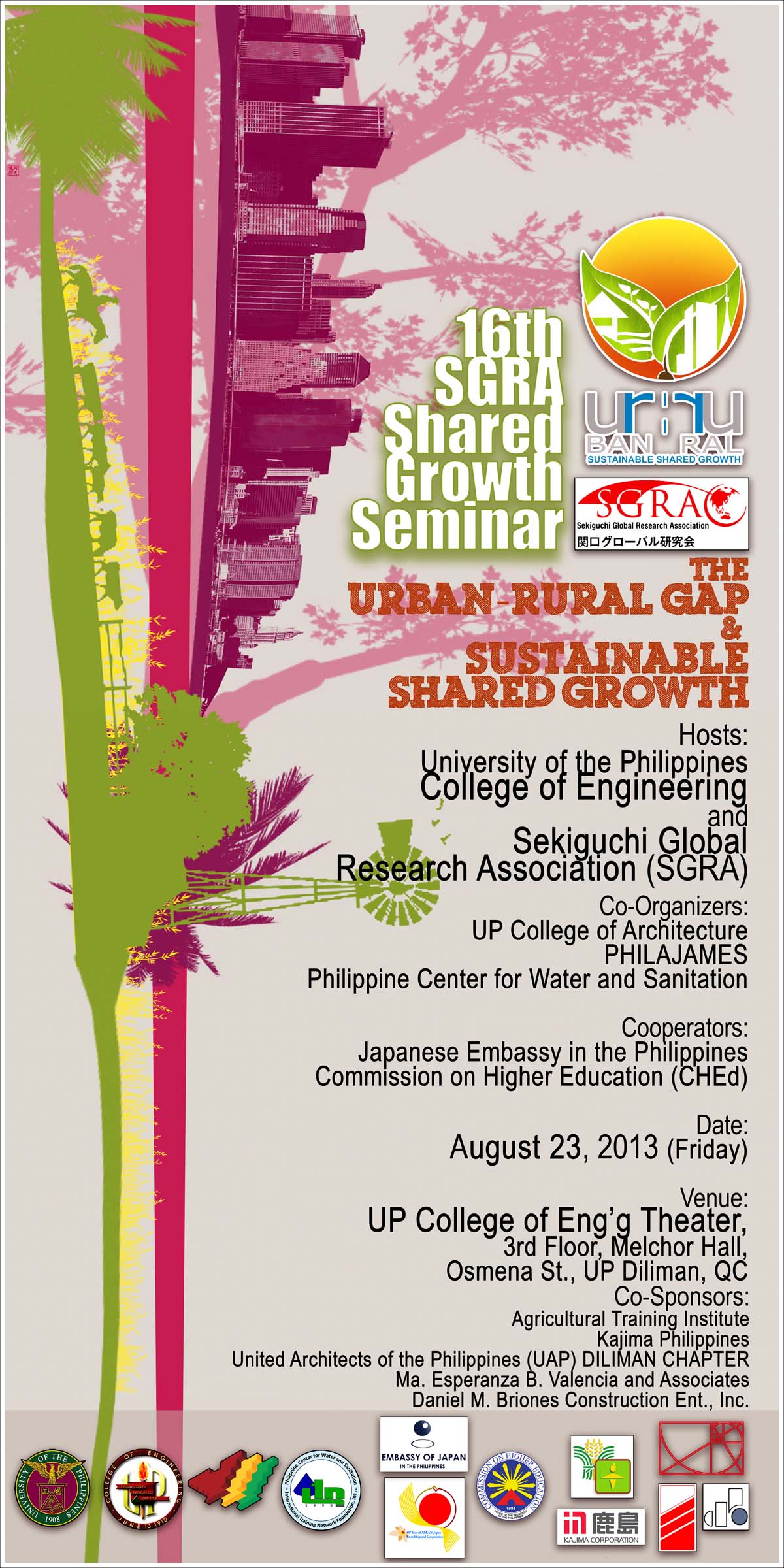Shared Growth Lessons from Japan (No.1 of a Series)
This gives an overview of a series of presentations to be made in the SGRA KKK (Kahusayan [Efficiency], Katarungan [Equity], Kalikasan [Environment]) seminars. The series hopes to express, in terms comprehensible to non-economists, the results of study on what this economist considers as one of the invaluable lessons that could be learned from Japan. This is the so-called “shared growth” development experience, wherein Japan was able to achieve rapid economic growth and significant improvement in income distribution. This presentation traces the sources of Japan’s ability to achieve shared growth to three aspects: 1. development financing; 2. development policy/strategy; and 3. corporate architecture. In addition to shedding light on an often-misunderstood East Asian neighbor, this study hopes to contribute to Philippine development, which is in dire need of achieving shared growth. The absence of shared growth implies a situation wherein there is a significantly large gap between the core and periphery sectors of an economy or a region. Later presentations of this series in future seminars will go deeper into the points raised in this presentation.
Profile:
Dr. Ferdinand C. Maquito (nickname: Max)
Philippine Chief Representative, Sekiguchi Global Research Association (SGRA)
Through SGRA, he pursues his research and advocacy for sustainable shared growth in the Philippines through manufacturing and the empowerment of poor rural communities
Education
Ph.D. in Economics from the University of Tokyo (1996)
M.S. in Industrial Economics, Center for Research and Communication (1986)
B.S. Mechanical Engineering from the University of the Philippines (1982)
On-going Research Projects
1. Urban and Rural Poor Communities with Prof. Toru Nakanishi, University of Tokyo
2. IT Industry and Development with Prof. Hitoshi Hirakawa, Kokushikan University (Prof. Emeritus, Nagoya University)
3. International Labor Migration with Prof. Tran Van Tho, Waseda University
Some recent publications/presentations
1. “Towards a Strategy for Manufactured Exports to Japan” Philippine-Japan Economic Partnership Agreement: Strengthening the Foundation for Regional Cooperation and Economic Integration Vol. 2 Philippine Institute of Development Studies 2013 (forthcoming)
2. “The Dynamics of Social Networks in Philippine Poor Communities—From Giant Leaps to Small Steps” Philippine Journal of Labor and Industrial Relations 2012 (forthcoming) – paper submitted to the SGRA First Asia Future Conference in March 2013, where it was selected as one of the Best Papers
3. “A Comparative Economic Analysis of Japanese-Style Labor Contracts from a Shared Growth Perspective” Philippine Journal of Labor and Industrial Relations Vol. 31, Nos. 1&2, 2011(2nd author: Hitoshi Hirakawa), reprinted in The Second Book on Sustainable Employment Relations” J.V. Sibal, R. A. Asuncion, et.al. (eds.), Manila: Philippine Industrial Relations Society, Inc. 2012
4. “Mega Toushi Manira ni Okeru Kankyouteki ni Jisoku Kanou na Koutsu he no Chouzen: EDSA wo Chuushin ni” (Challenging Environmentally Sustainable Transportation in Mega City Manila: Focus on EDSA” , Proceedings of the 38th SGRA Forum in Tateshina, Japan (held July 3, 2010) SGRA Report No. 55, December 15, 2010
5. “KyouyuuGata Seichou Toshiteno Higashi Ajia Tougou” (An East Asian Integration as Shared Growth), Chapter 21 (co-authored with Hitoshi Hirakawa) in “Higashi Ajia no Shin Sangyou Shuseki: Chiiki Hatten to Kyouryoku/Kyousei” (New Industrial Agglomeration of East Asia: Regional Development in Copperation and Symbiosis), Hitoshi Hirakawa, Makoto Tawada, Ryuhei Okumura, Nobuyoshi Yamori, Jong-He Seo (eds.), Tokyo: Gakujutsu Shuppankai, November 2010
6. “East Asian Integration and Shared Growth: Some Preliminary Results of a Center for Buoyancy Approach” (co-authored with Hitoshi Hirakawa) in Proceedings of “International Conference: Industrial Agglomeration, Regional Integration and Durable Growth in East Asia” sponsored by the Faculty of Banking and Finance, and the Faculty of International Economics of the Foreign Trade University (Hanoi, Vietnam) and the Graduate School of Economics and the Economic Research Center of Nagoya University, October 28 – 29, 2010, Hanoi, Vietnam, pp. 250-267
7. “Rediscovering Japan’s Leadership in “Shared Growth” Management”, Rikkyo Business Review Number 3, July 2010, pp. 20-38 (co-authored with Henrietta Carbonel)
8. “A Roadmap for Shared Growth through the Philippine Auto Industry”, August 1, 2008, mimeo, 132 pages (submitted to a major Japanese automotive firm and the Philippine Department of Trade and Industry)
Presentation Slides
Thank you for not plagiarizing. Support us by properly citing the title, author, and seminar (SGRA 16th Sustainable Shared Growth Seminar, "The Urban-Rural Gap and Sustainable Shared Growth", August 23, 2013, College of Engineering, University of the Philippines)
